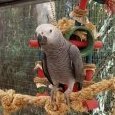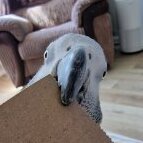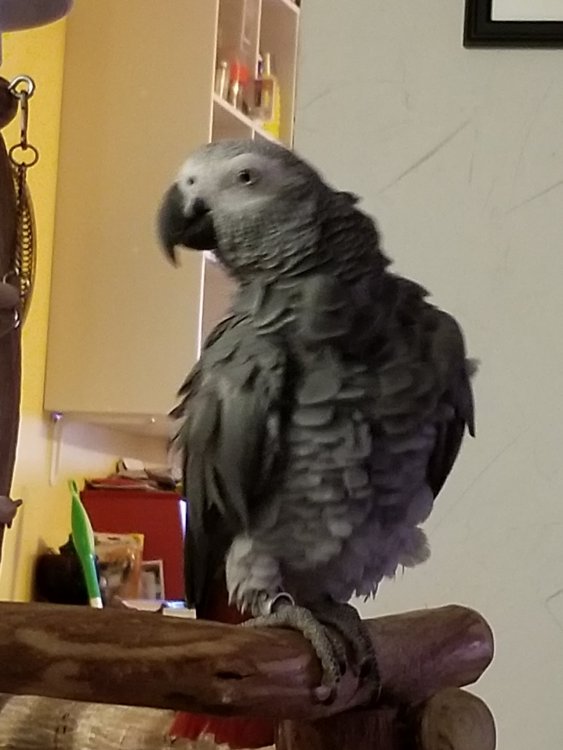NEW ADDRESS FOR MEMBERS GREYFORUMS.ORG
Leaderboard
Popular Content
Showing content with the highest reputation on 04/19/2019 in Posts
-
Look up Sally Blanchard's Chair Exercise. Not the first time I've read about a clipped bird losing trust.2 points
-
Wanted to up date, we where doing fairly well, but I was getting concern she would hurt herself flying into things, so I took her to get her wings clipped. Will we have taken a major step back. She wont let me run her head or anything. She will take food and talk to me but not touch her. It literally breaks my heart, my surgery is tomorrow and I will be home for six weeks, I sure hope I can gain her trust back.2 points
-
I adopted a two year old female grey, Her owners are moving to Alaska and could not take her. She was supposedly not a bitter but had experienced a issue where an adult handle her incorrectly and scared her. I have had her about three weeks. I have been giving her lots of space and letting her call the shots so to speak. I open her cage and let her come out when ready I offer my head slowly until she steps up. We will be doing fine then she will just bit me. I try not to react much but of course it hurts. I just say be a good bird. Her wings arent clipped. I dont know what to do, I really want a tight bond with her but I just not sure if I made a wrong choice buy not buying a baby.1 point
-
And careful about using advice from FB, there are a lot of parrots there that just repeat garbage they've read without any real thought about it. My favorite is the "how long do they live" and then the "80 years+" answers start rolling in. Anyway, if you would have asked here first, I would have suggested putting towels on your windows and mirrors until they get the lay of the land. That's a much better solution than clipping. All 8 of my birds are flighted. I will never clip a bird as they love the freedom to scoot around in the fashion birds do - through the air. Im' a little jealous actually. You just need to take precautions for escape exits and ceiling fans etc. Use the forum to ask, someone here knows.1 point
-
I truly wasnt trying to do anything mean or wrong. You get so much advice, you get yes and no's, I really only want to take good care of her, get her to love me as much as I love her and have companion for life.1 point
-
She hadn't become used to your layout; hence the flight into things. She would have soon figured out the lay of the land. Clipping a flighted bird greatly impacts their psyche. Now, if she needed to safely fly away from your dog or anything that causes her dis-ease she can't.1 point
-
It was a hard decision to make I was worried about her hurting her self, she would fly into window or door them land on the floor, I was terrified she would get hurt. I would be very interested to hear the reasoning behind non clipped, its safety and then do any of you use flight harness. I really want this next six weeks to count with my doxie1 point
-
It is a step back but it won't last, just keep talking to her and don't touch until you get a signal from her that she is ok with it. Please consider leaving the wings unclipped as most of us here do not clip our birds wings.1 point
-
Peggy, someone just posted a link to an article that addresses various undesirable parrot behaviors. https://blogpamelaclarkonline.com/2019/01/31/parrot-and-start-buttons/?fbclid=IwAR3uc7jvv84yWVBMBd4ZWv1ffY_IauCRWxeTSLJKIfjPhn-sdMbt6bsu8jI1 point
-
This is so wonderful having all this help. Her past owners said that one in there because it was her favorite sleeping perch, but I dont want her to get hurt I'll change it.1 point
-
Well, you're further along with Dixie than I am with Huey. I can't pet Huey on the head like that without a definite hard bite. She seems to be somewhat anxious and playful at the same time. I can tell you'll get a long ways with her if you don't lose patience. Try interacting a lot with her at night just before bed time. They all seem to put their inner dinosaurs to bed early and then you're left with a cuddly Grey bird to interact with.1 point
-
Well, it took awhile but finally loaded. First, if it were me, I wouldn't keep offering my hand when she's actively showing signs of wanting to nibble/bite. Wait for her to tuck her head before approaching her. If she's reaching for you, that's not the best time to offer her your hand. I'd like to make a safety recommendation for you to consider. Her rope perches are super frayed, which is actually a huge hazard for birds. Many birds have become stuck in the hanging threads and some parronts have actually lost their babies. I'd replace those as soon as you can, ideally with non rope perches, such as manzanilla or dragonwood. Until you can change them out, you can actually trim off all those loose strands. Your baby looks like she's full of personality! Very sweet girl!1 point
-
It's not downloading for me. With grays, it's best to monitor their behaviors in real time. I have 3 grays, and watch their queues to see when they want some lovin' or to be left alone. They can start out looking for affection, but then switch mid stream. If you learn to read them, then you'll know when they'd like for you to stop doing what you're doing.1 point
-
Does help you guys and gals to see and understand her movements and gestures. I want to love on my baby, there are times when she will kiss me and say I love you then bite me.1 point
-
1 point
-
I think you can upload videos to this forum? I've not tried it myself. Alternatively you could upload to youtube or another video/file sharing site and post the link. I have had Alfie for coming up on 16 years and I had him since he was 11 weeks old. I am still learning new things about him on a regular basis. They forever keep you on your toes and surprise you in new ways all the time! I wouldn't say you were doing anything wrong as such - as you are trying to introduce Dixie to her new home and allow her to integrate with the family. She will happily do this with time- it might just take her a little longer to get fully settled and comfortable with the changes first. Keep working with her and it will soon feel like she has always been a big part of your family!1 point
-
I'm trying to figure out how to record some interactions between Dixie a I hoping maybe you can look at her body language and help me understand what she is trying to tell me.1 point
-
Life with a Grey makes for patience being our first lesson. Congrats on adopting a recycled bird she will enrich your days. Look forward to the progress you will make together.1 point
-
Thank you for the wonderful tips. I have been going about this wrong. She loves almonds and and red grapes, I have been trying to win her over with food so I have been treating her to much. The biting started when I bring her into the living room to her wood perch. So I your right I shouldn't be taking her so far from her home cage. I'm so grateful for the help1 point
-
Hi Peggy and welcome to the fourms! Thank you for taking in a rescue grey! First of all, these birds operated in what we call "grey time". This is the time it takes for an individual bird to accept changes in their environment- be it a new food, new toys, new people, new cage etc etc. Every bird is different and will accept changes at their own pace. Trying to force the issue will cause a fear response and will damage the relationship with your bird. So it is absolutely critical to observe the birds responses and start learning a bit about their body language. Body language in grey's is quite subtle at times and sometimes we don't always notice it. A bird can be trying to tell us a lot through their body language and we totally miss it, so the last resort is a bite to get their message across. Your bird has just had a massive change to their lifestyle. Did you know or interact with your bird at all before bringing her home? If not then absolutely everything in her life has been tipped upside down and she is probably still adjusting to changes. New home, new flock, new environment, new routines... it's a LOT to take in! She will need some time and space to adjust to all these changes. But she will get there and she will accept you as part of her flock. At two years old, she is still a very young bird so I have no doubt that given enough time you will build a wonderful bond with her. Do you know what her favourite treat is? If not, try offering her lots of different foods and treats until you find one or two she REALLY likes. So for example, if she really likes almonds, do not feed them as part of her daily diet- keep them as rewards. You can then use that favourite treat as a reward for good behaviour - this is positive reinforcement. So if she steps up, she gets a piece of almond (not a whole one - save whole ones for REALLY good work). Do not move away from the cage at this point- just get her stepping up regularly. Always let her go back to her cage or a perch if she wants to at this point. You can then start rewarding her for staying on your hand. Again, use a piece of almond not a whole one. If she's still comfortable and content on your hand for a few more moments, she gets another piece. If she's still doing really well and making no attempt to leave, maybe go ahead and give her a whole piece. Again, always give her the option of getting back to her cage. As she is clipped and maybe unable to fly then always give her the option to retreat back to her cage, as she doesn't have a flight option. Keep talking to her whilst she is on your hand - make it sound like a good thing and sound excited about it. Tell her about all the places she will be able to go with you if she stays on your hand rather than going back to the cage. Make it a fun and positive experience for her. Once she has mastered this (and it may take some time) then SLOWLY start moving her a little further away from her cage. Reward her for staying calm. If she bites, do not take it personally (even when it hurts!) and just calmly return her to her cage and back off. Keep using pieces of whatever her favourite treat is. Only reward with a whole treat occasionally. This helps to keep the bird motivated to work towards the big treat. Or if she has a couple of favourite treats, find out which she likes better and use that as the special treat. Keep these training sessions short to begin with. She might not have had much structured training so it might take her a little while to figure out what's going on. Get her to repeat the behaviour successfully a few times then stop. You can slowly extend this if she is willing- but as soon as she shows sign of boredom (or goes for a bite) then back off and let her return to where she is comfortable (a perch or her cage) Do keep us updated with any progress. We would also love to see photos of her if you are able to.1 point





